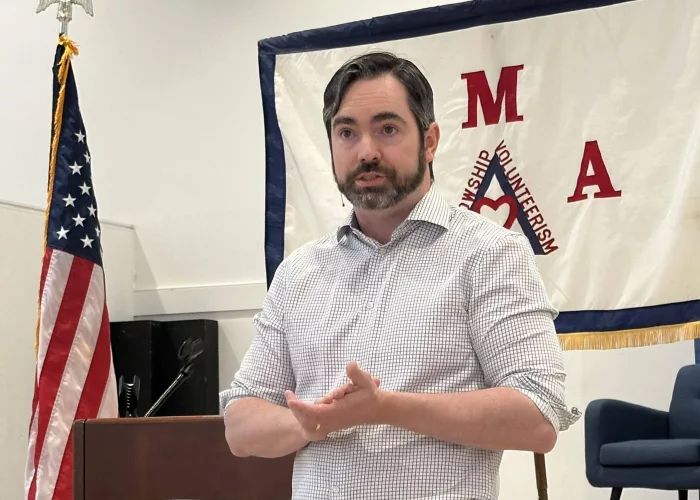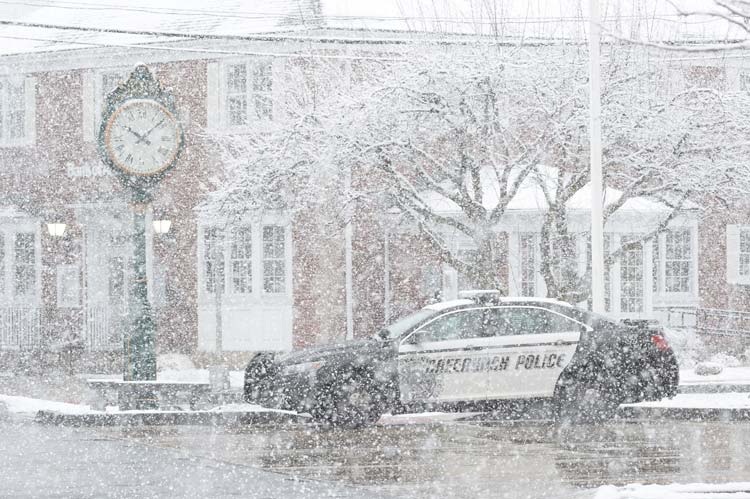
By Mike Tebay
On May 14, Peter Berg introduced Peter Harrison, the Connecticut Director of the Regional Plan Association, who spoke about the future of housing, transportation, and clean energy in Connecticut and how Connecticut fits into the “Megaregion.” Pete became RPA’s director of Connecticut programs in 2024. Prior to that he was director of its Desegregate CT program, leading a statewide program to enact equitable and sustainable land use policies in Connecticut. Prior to joining Desegregate CT, Pete was as a research scholar at Columbia University and the senior national housing advisor for the progressive think tank, Data for Progress, focused on federal housing and land use policy. Pete has extensive political campaign experience, advising the presidential campaigns of Vice President Kamala Harris, Senators Bernie Sanders and Elizabeth Warren, and former HUD Secretary Julian Castro. Pete grew up in Avon, CT and holds a BA in history from the College of the Holy Cross and an MUP from Columbia University. He also teaches at the City University of New York.
Mr. Harrison began by explaining that the RPA is a century-old, nonpartisan civic organization, focused on long-term planning for critical regional issues like transportation, housing, energy, and governance, across New York, New Jersey, and Connecticut. They produce comprehensive regional plans about once a generation, with the fourth published in 2017, aiming for equitable and sustainable growth. The RPA acknowledges that some past advocacy, such as post-war urban renewal and highway construction, resulted in negative outcomes, and the organization now prioritizes empirically driven research and advocacy.
A key concept discussed was the “Mega Region,” extending from Washington, D.C., to Boston, encompassing about 50 million people. Thinking of Connecticut as part of this larger region highlights opportunities for integrated infrastructure planning, despite challenges in coordinating across state lines. These large-scale issues affect local communities, impacting commuting and affordability.
In Connecticut, a major focus for RPA is the housing shortage. Mr. Harrison previously directed Desegregate Connecticut, advocating for land-use reform to increase housing opportunities. Other areas include improving rail lines like Metro-North and Amtrak, bus systems, and developing an agenda around the clean energy transition.
Mr. Harrison was at pains to stress that, despite his own personal progressive background, the RPA works at a bipartisan level in all three states, and increasingly at the national level. He also noted the growing “abundance” movement, which recognizes that we have atrophied at federal, state, and local levels in terms of building infrastructure projects. This is reflected in an emerging bipartisan group, the “Build America” caucus, just launched in Washington, DC. Mr. Harrison detailed several RPA initiatives:
Gateway Project: RPA champions this multi-agency plan to build new tunnels under the Hudson River to increase rail capacity for NJ Transit, Amtrak, and eventually Metro-North trains into Penn Station. RPA research highlights billions in potential economic benefits.
Congestion Pricing in NYC: RPA has advocated for this policy for decades. Early data shows it is reducing peak traffic by 10-15% and generating about $115 million revenue for MTA upgrades and the bus system.
Housing Gap: RPA research with McKinsey consultants identified a shortage of hundreds of thousands of homes in the metropolitan region based on expected population growth over the next several decades and the effects of climate change on vulnerable existing homes.
Flooding Risks: RPA research highlights risks to coastal housing stock, stressing the need for collaboration between local, state, and federal governments.
Mr. Harrison concluded with optimism about Connecticut’s potential to be a sustainable, equitable, and prosperous place. He highlighted the state’s history of walkable communities around early train stations built for industry as a model for future growth. He stressed that the challenges of housing shortages and climate crisis are interconnected and require comprehensive regional solutions, not siloed approaches. He urged collaboration and good faith, acknowledging that change is inevitable and encouraging audience participation in shaping the future.
Responding to audience questions:
Work Live Ride Program: Mr. Harrison explained that this is a state program for towns that want to pursue transit-oriented development (TOD). It emerged after an earlier, mandatory proposal modeled on Massachusetts faced backlash. By contrast, Work Live Ride is optional, giving towns the flexibility to choose TOD and thereby gain access to limited state resources and coordination planning assistance, without mandated specific densities or strict half-mile radii near transit hubs. He acknowledged the difficulty communicating density and zoning changes and overcoming fear associated with terms like “density” and “desegregate.”
Congestion on Route 95: He acknowledged it is one of the most congested highways nationally, with environmental and economic costs. The fundamental solution isn’t just highway efficiency but reducing the number of cars, by improving public transportation, walkability, reducing local highway usage, and moving freight from trucks onto ferries and drones? He anticipated congestion pricing on interstates might resurface as a topic due to its effectiveness.
Energy: RPA is working on a big report about the electric grid. He noted RPA supports an “all-the-above” approach for the clean energy transition, but doesn’t have a specific report on small nuclear reactors yet.
State of Penn Station: Calling the tearing down of the original station a “crime,” Mr. Harrison noted RPA’s decades-long involvement in rethinking Penn Station. The current primary focus is the Gateway Project, which is underway and has secured funding for new tunnels to increase capacity. While challenges remain regarding terminal space and political complexities (MSG, potential Trump involvement), he expressed optimism about future improvements, particularly with Metro-North’s planned integration into Penn Station.
The talk can be viewed by going to the RMA website at https://greenwichrma.org, and clicking on “Speakers.”
The RMA’s upcoming presentation, “A Conversation with Maestro Malina” by the Stuart Malina, is scheduled for 11 AM on Wednesday, May 28, 2025. RMA presentations are held at Christ Church Greenwich, Parish Hall, 254 E. Putnam Avenue, Greenwich, CT 06830.
Since Stuart Malina became the Music Director of the Greenwich Symphony in the Fall of 2022, he has brought his own style of conducting, rehearsing, programming, and community outreach to the 67-year-old organization. During his tenure, concert attendance has increased by over 50%, and the growth continues. Malina carefully selects the works presented at each concert, always aiming to offer an appealing mixture of beloved favorites, worthy but less-known classics, and important works of contemporary composers. He is known for his insightful comments about the concert programs in pre-concert videos on social media and in brief remarks from the podium ahead of each performance, building anticipation in the audience.
During this interview-style presentation, Stuart Malina will address questions about unique experiences in his career as a conductor; current trends in composition, programming, and performance; what he looks for in selecting soloists for collaborations; and what distinguishes “classical” music from popular music. In addition, Malina will speak about the upcoming GSO performances of Beethoven’s Ninth Symphony and Leshnoff’s String Quartet No. 3 (arranged for string orchestra), on May 31 and June 1.
Stuart Malina majored in music at Harvard College, received a master’s degree in music from Yale University and a diplomate in conducting from the Curtis Institute of Music. He has conducted numerous orchestras in the United States and abroad, including in Russia, Hong Kong and China. He is currently the music director of the Harrisburg (PA) Symphony Orchestra and the music director of the Lake Placid (NY) Sinfonietta, as well as the Greenwich Symphony.
To stream the presentation by Stuart Malina at 11 AM on Wednesday, May 28, click on https://bit.ly/30IBj21. This presentation will also be available on local public access TV channels, Verizon FIOS channel 24 and Optimum (Cablevision) channel 79.
Note: The views expressed in these presentations are those of the speakers. They are not intended to represent the views of the RMA or its members.
RMA speaker presentations are presented as a community service at no cost to in-person or Zoom attendees, regardless of gender. Any member of the public who would like to receive a weekly email announcement of future speakers should send a request to members@greenwichrma.org. The RMA urges all eligible individuals to consider becoming a member of our great organization, and thereby enjoy all the available fellowship, volunteer, and community service opportunities which the RMA offers to its members. For further information, go to https://greenwichrma.org/, or contact info@greenwichrma.org.




